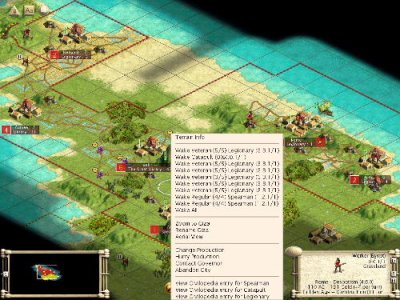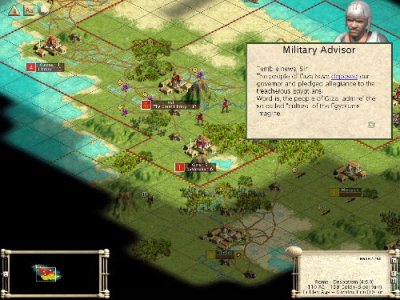Originally posted by JFL_Dragon
I apologise if that was the way it sounded as it was not my
intention. My intention was to point out that I find it an issue
about monarch level (especially deity) and unless you are playing
above that level you wont know exactly what Im talking about.
(Ive edited that original post)
I'm sorry; it's very late in California, USA, so maybe I misinterpreted your original post. I thought you were implying that only play at higher levels provides true insights into culture flipping and that therefore only those playing at higher levels deserved a voice in the discussion - that attitude deserved a flame

but I now understand that you weren't projecting that attitude.
In a test I showed a 2 city getting flipped with a garrison of 17.
This can hardly be a bad tactic, but rather bad luck from the CF
prob formula, so hence dont put any units in cities.
The size 2 city with a size 17 garrison is on the extreme and I didn't see your test for this - but even so I wouldn't immediately characterize a flip as a bad or good tactic without knowing all of the variables. Was the size 2 city was almost entirely surrounded by enemy culture and hadn't expanded its borders beyond the initial 9 tiles - since each of the 21-tile radius counts as an "enemy citizen" for purposes of calculating garrison size, perhaps that size 2 city was, for purposes of the flip risk, operating like a size 10 or 11 city? And perhaps the 2 citizens were resistors (so counted as 4 citizens)? And perhaps total civilization cultural ratios were severely imbalanced, because the human player had focused all production efforts on military units and settlers? Without seeing the test, I can't comment on it directly, but I certainly don't discount that this could be one of the (as I said in my original post) very rare cases where a very unlicky die roll foiled otherwise well-planned action.
I tend to dislike anything which causes a major change
between 2 players doing exactly the same thing, and CF is that
one thing that can cause such a major change
Eg One player losing 17 units and the other player not losing any.
I enjoy some of the random features like battle outcomes but in
my own opinion they dont really have a major effect on the game
like an unlucky CF.
I understand your point. However, the thorough knowledge of how culture flipping operates, and the subsequent development of tactics to prevent an untimely flip from altering the balance of power are really all that is needed to ensure competitive gameplay. Bad things happen. Unlucky events strike us all. The 2 city flipping with 17 troops may in fact have been player error (depending on the other game circumstances). Anticipating and taking preventative measures are important tactics, both in regards to culture flipping and in regards to defensive planning in times of peace or war (but we don't hear nearly as much vitriol about AI sneak attacks on weakly defended border cities).
My one big complaint regarding culture flipping is actually not about culture flipping per se, but rather about how the feature was presented and described to players (in the manual and civilopedia). It took considerable testing by several posters and, ultimately, numerous posts from the game designers to communicate the basics of how culture flipping works (i.e., that enemy controlled tiles counted as "citizens," that resitors counted as "two citizens," that both total culture and city-specific culture played a role, etc.). Most people who bought and play Civ 3 will never visit these boards, and the fundamentals of culture flipping will remain a total mystery to them - "crazy" things happening without any known or knowable counter-tactics, particularly things which can dramatically alter the balance of power, cause confusion and frustration, but do not add to gameplay. But posters here don't have that excuse

. The fundamental mechanics of culture flipping are out there - it is up to the player to develop counter-tactics.
You are the first player I heard from that plays above Monarch
that actually likes it

I think there are many of us

. Why do I like it? It adds complexity and strategic depth to decision making. War time decision making - whether to garrison a captured city or station troops outside the city - is a tactical consideration, and a fairly straightforward one at that - I tend to have
very little sympathy for complaints about war-time flips of recently conquered cities. Peace-time decision making, however, becomes more strategic with the knowledge that culture flipping is a possibility, and becomes nail-biting on the higher difficulty levels where culture flipping is a more likely event due to early AI culture leads. With AI opponents on the higher difficulty levels starting with a large number of additional units and enjoying significant production bonuses, I sense (from these boards) that the general attitude among players during the early game is to build exclusively: (1) military units; (2) settlers; and (3) the occasional worker. Temples or early libraries are not given much attention ("too costly," "a waste while a despot," "I need to reach military parity right away . . . and then superiority," etc.). But, through the implementaion of culture and culture flipping, doing so comes at a significant cost -- no cultural improvements = low civ culture (bad) and no expanding city borders (bad). Without the threat of future culture flips, why wouldn't I put off cultural improvements in favor of military and expansion units?
A few simplistic examples of what I mean by strategic depth to decision-making versus tactical considerations (since I feel I am rambling without making my point clearly):
* It is early in the anciant age, is that pair of spearmen the right build decision, or is an early temple more appropriate? Should I build warriors and chariots almost exclusively for an upgrade and neighbor rush? and if I do what will the world / continent look like after the war is over (will I be surrounded by AI civs that have been producing cultural improvements while I have been producing only military units)?
* Who are my neighbors - are they religious (and therefore likely to build cheap temples early)? - maybe I should expand away from them even though the land is fertile in their neck of the woods - and maybe I should pop-rush a temple or two along my borders with them -- that city border expansion could really be useful in preventing an early flip.
* Wow - I've made it into the middle ages - should I build a ton of knights, or should I focus more attention on getting cathedrals and universities up and humming, even given their high cost?
All of these decisions play a role in culture flipping, and I suspect that because an episode of city flipping is more or less impossible to trace to one or even a few discrete decisions, the cumulative effects of player decisions regarding cultural strategy are lost in the anger and shock of losing a city.
I contend that when the anger and frustration hit, it is better to evaluate and try to learn why it happened, rather than starting 2 or 3 different threads complaining about the concept in general. In the 3 or 4 posted examples that I've seen where someone has actually posted a saved game or detailed screen shots and supporting information of "egregious" flips, the suspect flips have not seemed to me to be egregious at all - they have by and large seemed to be accidents waiting to happen.
(BTW, the two most recent I saw were (1) Killer's - and I posted my views in that thread - and (2) Zouave's - just looking at Zouave's screen shots his flip doesn't look at all unexpected or egregious to me.)






 . The fundamental mechanics of culture flipping are out there - it is up to the player to develop counter-tactics.
. The fundamental mechanics of culture flipping are out there - it is up to the player to develop counter-tactics.